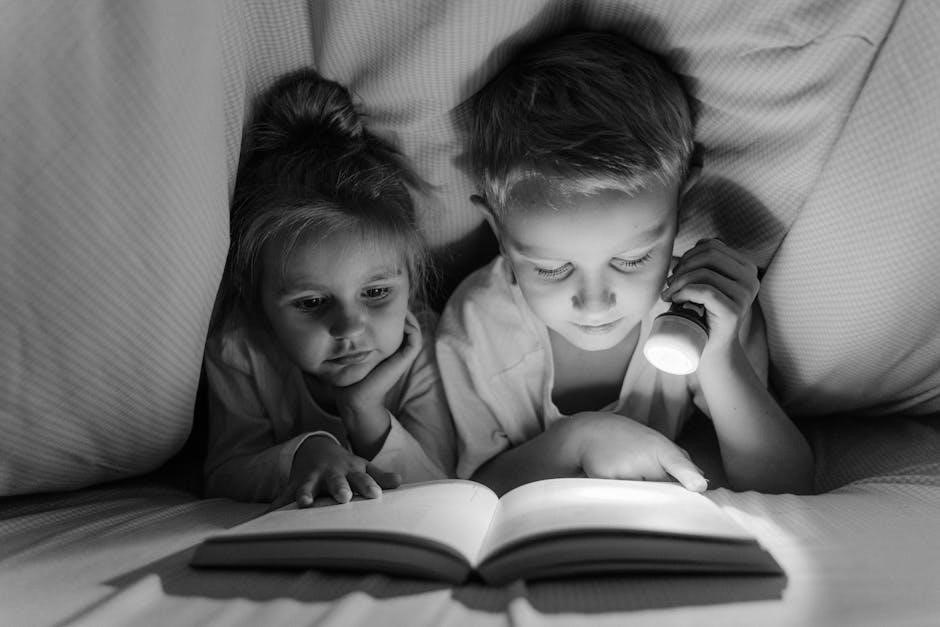Night by Elie Wiesel is a haunting memoir of the Holocaust, recounting the author’s harrowing experiences as a teenager in Nazi concentration camps. This seminal work offers a deeply personal and historical account of one of humanity’s darkest periods, exploring themes of faith, survival, and the loss of innocence. Wiesel’s vivid narrative provides a powerful window into the atrocities of the Holocaust, making it an essential read for understanding its profound impact on individuals and society.
Overview of the Book
Night by Elie Wiesel is a haunting memoir recounting the author’s experiences as a teenager during the Holocaust. The book chronicles his journey from his hometown of Sighet to the concentration camps of Auschwitz and Buchenwald. Wiesel vividly describes the horrors of the camps, grappling with faith, hope, and the loss of innocence. This powerful narrative is a poignant exploration of humanity’s darkest hour, translated into over 30 languages and selling millions of copies worldwide.
Author Background: Elie Wiesel
Elie Wiesel, a Nobel Peace Prize laureate, was born in 1928 in Sighet, Romania. A Holocaust survivor, he lost his family in Auschwitz and Buchenwald. After the war, Wiesel became a prominent writer and advocate for human rights, dedicating his life to combating injustice and promoting peace. Night, his first book, is a memoir of his Holocaust experiences and has become a cornerstone of Holocaust literature, translated into over 30 languages and widely acclaimed for its emotional depth and historical significance.
Historical Context of the Holocaust
The Holocaust, a systematic genocide by the Nazis during World War II, targeted six million Jews and millions of others deemed undesirable. It began with anti-Semitic policies and escalated into mass deportations to concentration camps like Auschwitz, where atrocities were committed on an industrial scale. Elie Wiesel’s Night captures the horror of this period, offering a personal lens through which to understand the broader historical tragedy and its profound impact on humanity;
Plot Summary and Structure
Night by Elie Wiesel is an autobiographical account of a young boy’s experiences during the Holocaust, detailing his journey through Auschwitz and Buchenwald. The narrative explores themes of faith, survival, and the loss of innocence, structured chronologically to reflect the escalating horrors of the concentration camps.
Chapter Breakdown: Key Events and Themes
Night by Elie Wiesel is divided into nine chapters, each detailing pivotal moments in Eliezer’s Holocaust experience. Chapter 1 introduces Sighet and Moshe’s warnings, while Chapters 2-3 describe the journey to Auschwitz and the initial horrors. Chapters 4-7 explore life in the camps, focusing on survival struggles, faith crises, and the bond with his father. The final chapters depict the liberation and Eliezer’s emotional numbness, highlighting themes of humanity’s darkest capacities and the enduring quest for hope amidst despair.
The Journey from Sighet to Auschwitz
The journey from Sighet to Auschwitz marks the beginning of Eliezer’s descent into the Holocaust’s abyss. Forced onto cattle cars, the Wiesel family endures cramped, unsanitary conditions and relentless fear. Upon arrival, the chaos of separation and the horrors of the selection process shatter their lives. This traumatic transition symbolizes the destruction of innocence and the dehumanizing efficiency of the Nazi regime, setting the tone for the atrocities to follow.
Major Turning Points in the Narrative
The deportation from Sighet to Auschwitz is a pivotal moment, marking the end of Eliezer’s innocence. The arrival at Auschwitz, where his mother and sisters vanish, shatters his family. The hanging of a young boy in the camp shocks Eliezer, deepening his existential despair. Later, the death of his father in Buchenwald signifies the ultimate loss of hope, while the liberation of the camp by American soldiers brings a bittersweet end to his ordeal.

Themes and Motifs in Night
Central themes include faith’s collapse, innocence’s loss, and survival’s struggle. Motifs like silence, darkness, and fire symbolize the Holocaust’s dehumanizing horror and existential despair.
Faith and Doubt in the Face of Atrocities
Elie Wiesel’s Night explores the profound struggle with faith amidst unimaginable suffering. The narrator witnesses atrocities that challenge his belief in a benevolent God, leading to spiritual crises and existential questions. The Holocaust’s horrors force him to confront the silence of God, questioning divine justice and humanity’s capacity for evil. This internal conflict becomes a central theme, reflecting the broader theological struggles of survivors.
The Loss of Innocence and Humanity
Night vividly portrays the erosion of innocence and humanity during the Holocaust. Eliezer’s journey from a devout teenager to a disillusioned survivor underscores the brutal realities of the concentration camps. The dehumanizing conditions and unbearable suffering strip away moral frameworks, leaving individuals grappling with primal instincts. This loss of innocence reflects the broader devastation of human dignity and ethical collapse under Nazi oppression, forever altering Eliezer’s worldview.
Hope and Survival in Concentration Camps
In the midst of unimaginable suffering, hope becomes a fragile yet vital force in Night. For Eliezer and fellow prisoners, hope manifests as the will to survive another day, often sustained by small acts of kindness or the belief in a future beyond the camps. However, the harsh realities of the Holocaust test this hope, as many lose their resolve, succumbing to despair. Hope becomes a double-edged sword, offering both survival and the pain of clinging to it in a world devoid of humanity.
Symbols and Symbolism
Elie Wiesel masterfully employs symbols to convey the profound emotional and existential struggles in Night. Darkness and fire symbolize the destruction of innocence and faith, while silence represents the unimaginable horrors beyond words. These symbols enhance the narrative’s emotional depth, offering readers a vivid understanding of the Holocaust’s atrocities and their lasting impact on humanity.
The Significance of the Title “Night”
The title “Night” symbolizes the profound darkness—both literal and metaphorical—that permeates Elie Wiesel’s memoir; It represents the loss of faith, innocence, and humanity during the Holocaust. The recurring motif of night reflects the enduring emotional and psychological darkness experienced by survivors. For Wiesel, “night” embodies the void left by the atrocities, serving as a powerful metaphor for the horrors of the Holocaust and its lasting impact on humanity.
Fire as a Symbol of Destruction and Death
Fire in Night symbolizes the unimaginable destruction and death of the Holocaust. The crematoriums, where bodies were burned, represent the systematic annihilation of lives. Fire also signifies the loss of humanity and the hellish conditions of the concentration camps. For Eliezer, it embodies the literal and metaphorical inferno, where hope and innocence were consumed, leaving only despair and the ashes of a shattered world.
The Role of Silence and Darkness
Silence and darkness in Night evoke a sense of despair and the absence of divine intervention. The stillness of the night amplifies the horror of the Holocaust, while darkness symbolizes the moral and spiritual void. Eliezer’s experiences are shrouded in an oppressive silence, reflecting the world’s indifference to the suffering of millions. This eerie quiet underscores the dehumanizing nature of the concentration camps and the silence of those who failed to act.
Important Characters
Eliezer, the protagonist, endures unimaginable suffering, while his father embodies resilience. Secondary figures like Moshe the Beadle and the pipel symbolize warning and lost innocence.
Eliezer (Elie): The Protagonist’s Journey
Eliezer’s journey in Night is a harrowing transformation from innocence to despair. As a young boy, he is deeply religious, seeking spiritual guidance from Moshe the Beadle. However, the atrocities he witnesses in the concentration camps shatter his faith, leading to a profound internal conflict. His relationship with his father becomes central to his survival, as he struggles to maintain humanity amidst unimaginable horrors. Eliezer’s story is a testament to the resilience of the human spirit, even in the face of unimaginable suffering.
Elie’s Father: A Symbol of Strength and Weakness
Elie’s father embodies both strength and vulnerability, serving as a complex figure in the narrative. Initially, he represents resilience and protective instincts, guiding Elie through the horrors of the camps. However, the brutal conditions gradually erode his physical and emotional strength, revealing his mortality. Their bond, marked by mutual dependence, underscores the human struggle to maintain dignity and hope in the face of unimaginable suffering and dehumanization.
Moshe the Beadle: The Warning Ignored
Moshe the Beadle, a pious and gentle man, serves as a prophetic figure whose warnings of Nazi atrocities are dismissed by the Jewish community of Sighet. After witnessing the massacre of Jewish people, Moshe returns to warn the villagers but is met with disbelief and scorn. His tale of horror and death is deemed madness, highlighting the community’s inability to comprehend the scale of the impending danger, leaving them unprepared for the nightmare that awaits.

Famous Quotes and Their Analysis
Elie Wiesel’s haunting quotes, such as “Never shall I forget those moments which murdered my God and my soul,” resonate deeply, reflecting his struggle with faith and humanity amidst unimaginable atrocities.
“Never Shall I Forget” and Its Impact
Elie Wiesel’s haunting declaration, “Never shall I forget those moments which murdered my God and my soul,” captures the profound trauma of witnessing the Holocaust. This pivotal quote reflects his loss of faith and the shattering of his innocence. It resonates deeply with readers, illustrating the atrocities’ indelible mark on his psyche and humanity. The phrase has become iconic, symbolizing the Holocaust’s horrors and the enduring scars it left on survivors.
Quotes on Faith and God in the Camps
Elie Wiesel’s quotes on faith and God in Night reveal his spiritual struggle amidst unimaginable suffering. He writes, “Where is God now?” as he witnesses the hanging of a young boy, symbolizing the collapse of his faith. Another poignant quote, “My God died in the crematorium,” underscores the theological crisis faced by survivors, questioning divine justice and the existence of evil. These quotes profoundly explore the tension between belief and despair.
Elie’s Reflections on Humanity and Survival
Elie Wiesel’s reflections on humanity and survival in Night are deeply profound and haunting. He grapples with the moral decay of humanity, observing both the cruelty of oppressors and the resilience of the oppressed. Wiesel questions, “Humanity is not dead,” while acknowledging the profound darkness that emerges in extremity. His words, such as “There are victories of the soul,” highlight the enduring strength of the human spirit amidst unimaginable suffering.

The Impact and Legacy of Night
Night transformed lives, inspiring global awareness of the Holocaust. Oprah’s Book Club selection and Wiesel’s Nobel Peace Prize amplified its reach, fostering advocacy for peace and justice.
Reception and Critical Acclaim
Night received widespread critical acclaim for its raw, emotional portrayal of the Holocaust. Critics praised its unflinching honesty and literary brilliance, solidifying its place as a modern classic. The memoir has been translated into over 30 languages, selling millions of copies worldwide. Its inclusion in Oprah’s Book Club further boosted its popularity, introducing it to new generations of readers.
Night as a Holocaust Memoir
Night stands as a powerful Holocaust memoir, offering a personal and poignant account of Elie Wiesel’s experiences during World War II. The book vividly captures the atrocities of Auschwitz, blending Wiesel’s emotional journey with historical context. Its raw honesty and unique teenage perspective make it a vital document of the Holocaust, providing readers with a deeper understanding of its horrors and the resilience of the human spirit.
Elie Wiesel’s Nobel Peace Prize and Advocacy
Elie Wiesel’s Nobel Peace Prize in 1986 recognized his tireless advocacy for human rights and genocide prevention. Beyond Night, Wiesel dedicated his life to promoting peace and justice, becoming a global voice against oppression. His work transcended literature, inspiring movements to combat hatred and protect vulnerable communities, cementing his legacy as a moral leader and advocate for humanity.

Study Guide and Reading Resources
This section provides essential resources for understanding Night, including detailed summaries, analyses, and discussion questions to enhance your reading experience and deepen comprehension of the text.
SparkNotes and Other Study Aids
SparkNotes provides a comprehensive guide to Night, featuring chapter summaries, analyses of key themes, and explanations of famous quotes like “Never shall I forget.” Additional resources include Gale’s Novels for Students, offering in-depth breakdowns of characters, themes, and historical context. These study aids, along with guides by Dr. Miriam Klein Kassenoff and Pre-AP materials, help readers grasp Wiesel’s narrative, making the Holocaust’s atrocities and the book’s significance more accessible and understandable.
Discussion Questions for Readers
- How does Elie’s faith evolve throughout the novel, and what role does doubt play in his journey?
- What does the novel reveal about the psychological and emotional toll of living in concentration camps?
- How does Wiesel use silence and darkness as symbolic elements in the narrative?
- In what ways does the loss of innocence shape Elie’s identity and perspective?
- What lessons can modern readers draw from Wiesel’s experiences and reflections?
Further Reading on the Holocaust
For deeper understanding, explore other Holocaust memoirs like Man’s Search for Meaning by Viktor Frankl and The Diary of Anne Frank. Elie Wiesel’s Dawn and Day continue his trilogy. Historical works such as The Rise and Fall of the Third Reich by William L. Shirer provide context. These texts enrich the perspective on resilience, horror, and humanity during one of history’s darkest periods, complementing Night’s powerful narrative.
Night by Elie Wiesel is a powerful memoir that leaves a lasting impact, urging readers to reflect on humanity, faith, and survival. Its historical significance and emotional depth make it a vital read for understanding the Holocaust’s horrors and the importance of remembrance. Wiesel’s story remains a beacon of hope and a call to action against injustice.
Final Thoughts on Night’s Significance
Night by Elie Wiesel stands as a profound testament to the Holocaust’s atrocities, offering a deeply personal and universal exploration of faith, survival, and humanity’s darkest hour. Its vivid narrative and emotional depth make it an essential read, ensuring the memories of the victims endure and serving as a powerful warning against intolerance and injustice. Wiesel’s work remains a cornerstone of Holocaust literature, resonating with readers globally.
Encouragement for Personal Reflection
Reading Night invites profound personal reflection on humanity, faith, and resilience. Consider how Wiesel’s experiences resonate with universal themes of hope and despair. Reflect on the fragility of human dignity and the enduring strength of the spirit. Ask yourself how such atrocities could occur and what lessons they offer for fostering empathy and justice today; Let Wiesel’s story inspire a deeper commitment to understanding and preventing future injustices.